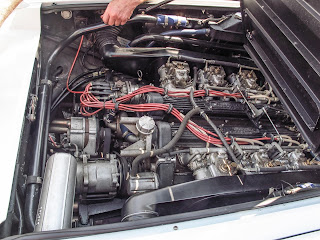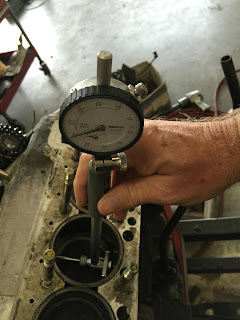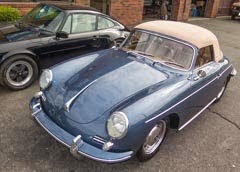The car was original and well preserved but the engine bay was looking a bit tired:
The engines in these cars are removed with transmission as a unit, from above. Some Ferrari models have removable subframes to simplify this process. In the big Lambo, the power plant is shoehorned in place and it's taken out with a great deal of care and a good-size crane.
When the engine came out you could really see the ravages of time. Paint was peeling, parts were rusted, and leaks and deterioration were everywhere. No teardown was needed to see that the motor was tired. The engine bay was tired-looking too.
With the engine out we began a careful process of disassembly. Everything was marked and parts were measured. We found a surprising amount of wear, for a motor with just 20,000 miles on it from new. However that is common with these vintage performance motors. Oil quality was not up to today's standards when these engines were made, and the material in these engines just seem to wear a lot faster than, say, the motor in a newer Mercedes.
Our evaluation revealed out of around and taper in the cylinders, which suggests an overheating incident in the past. Cylinder out of round is one of the major causes of oil consumption in these motors and this particular engine was using a quart every 100 miles. We also found deposits on pistons and valves, but no issues in the rods, bearings, or crank.
Parts for these old motors are getting scarce. Luckily we were able to buy a set of genuine pistons, liners and bearings - the last new old stock in the Lamborghini factory!
When you are working on a car as valuable as this one, attention to detail like this is very important. While our machinists worked on the inside we also cleaned up and refinished the outer parts of the motor.
Each of the internal parts of the engine was cleaned, checked for cracks and wear, and rebuilt. The new liners were installed in the block, and then the liners were bored to perfectly match the new pistons. Pistons and rolling parts were balanced before being installed in the rebuilt short block.
Once that work was done we moved the engine back into our mechanical shop for final assembly. That was a painstaking process that took a number of weeks because of the necessary attention to detail.
There's no "throwing it together" on cars like this. Every little detail has to be just right, and that job is often complicated by the one-off nature of the cars and the absence of service documentation. We rely on photos and experience more often that not. While that work went on we refinished the engine bay in the original style, but without the chips, grease, breakage and wear.
The results were worth the wait. The car runs better than it has in decades, and its value is markedly improved. A job like this should last a long time, and we look forward to this Countach giving its proud owners years of enjoyment.
(c) 2016 John Elder Robison
John Elder Robison is the general manager of J E Robison Service Company, celebrating 30 years of independent Lamborghini, BMW/MINI, Mercedes, Land Rover, Rolls-Royce and Bentley restoration and repair in Springfield, Massachusetts. John is a longtime technical consultant to the car clubs, and he’s owned and restored many fine British and German motorcars. Find him online at www.robisonservice.com or in the real world at 413-785-1665
Reading this article will make you smarter, especially when it comes to car stuff. So it's good for you. But don't take that too far - printing and eating it will probably make you sick.



























































3 comments:
John, you are a brave man. I certainly respect you and your team's abilities, but it seems a bit like taking out your own appendix with only a book to guide you!! Glad it all worked out.
Thanks for your comments, but I'm not sure why you'd see it like taking out our own appendix. This is not the first Lambo V12 we've done. None of them have good manuals but luckily things like bearings and piston clearances are standard and not individual for these old cars.
Thanks for posting this, one of my favorite cars. I was fortunate enough to be able to drive one (slowly, around the block) many years ago.
It's not clear from the pictures, but how is the engine connected to the transmission? Is it through those helical gears shown in the pictures? Do the engine and transmission share the same oil, like a motorcycle?
Was the transmission rebuilt as part of this process as well, or was it in decent shape? What about maintenance like changing the clutch - does that require engine removal as well?
Post a Comment